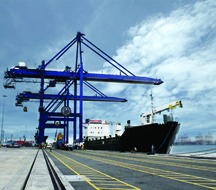

THE Philippine Ports Authority (PPA) has allowed the Manila North Port operator to charge cranage fees effective Jan 28, but granted sharply lower rates than proposed.
The Manila North Harbour Port Inc. (MNHPI) sought permission to levy cranage fees in early 2013 after it deployed three quayside and rubber-tired gantry cranes.
Under PPA Memorandum Circular No. 15-2013 (http://www.scribd.com/doc/199196077/PPA-MC-015-2013) dated Dec 27, 2013, the PPA set the cranage rate for twenty-foot equivalent units (TEUs) and below at P1,288 per loaded box, a rate 67.8% lower than the P1,900 that MNHPI proposed.
For empty 20-footers and below, the PPA granted a P1,083 rate, 147.6% lower than the proposed P1,598.
For containers larger than 20-footers, the fees will be P1,802 per loaded box and P1,396 for an empty, both 67.8% lower than the proposed P2,658 and P2,059, respectively.
Earlier, the Philippine Liner Shipping Association (PLSA) said the P1,900 proposed rate of MNHPI was 337% higher than in ports like Cebu (P666), Cagayan de Oro (P450), and Manila International Container Port and South Harbor (P626.25).
PLSA said MNHPI’s comparison of its rates with those of the Manila International Container Port and Batangas Port should have been on an “apple to apple” basis, or with the same type of product, service or operation.
A source from the domestic liner industry told PortCalls in a text message that “the shipping lines are really fighting for a reasonable manner of determining the rate. Notwithstanding that the cost will be passed on to our customers and ultimately to the consumers.”
The source added that the rate will not hurt carriers because it will be passed on to the customers as with the current practice with arrastre charges, that’s why customers “have a stake in evaluating how the rates were arrived at.”
Meanwhile, MNHPI’s petition for a 25.57% increase in tariff is still pending with the PPA. ––Roumina M. Pablo




